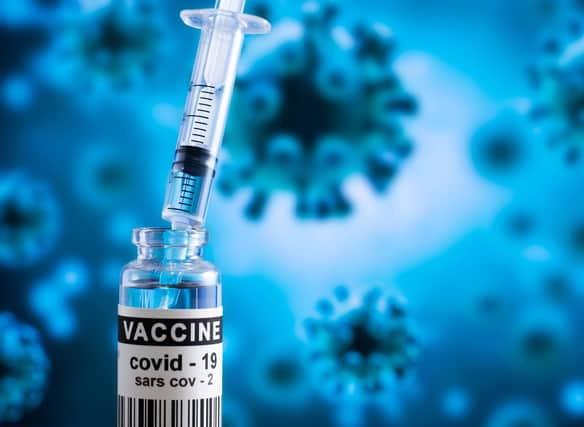How effective are Covid vaccines against the Delta variant? What does 'high viral load' mean?


With Scotland seeing a rise in daily positive Covid-19 cases to more than 3,000 cases in recent days, concerns over the fast spread of the Delta variant are growing.
But a new study from Oxford University’s Nuffield Department of Medicine, carried out jointly with the Office of National Statistics (ONS) and Department of Health and Social Care (DHSC), reaffirms that the best protection against the highly transmissible variant is still having both doses of a coronavirus vaccine.
Advertisement
Hide AdAdvertisement
Hide AdResearchers conducted a large community-based study with participants of randomly selected UK households, finding that having both doses of a Covid vaccine still gives you greater protection against Covid-19 and its associated variants than not having it at all.
Focusing in particular on AstraZeneca and Pfizer/BioNTech vaccines in the UK, the study found that vaccine efficacy differed across different age groups after receiving both doses of one of these two vaccines.
Here’s what you need to know.
Do Covid vaccines protect against the Delta variant?
The joint study from Oxford University, ONS and DHSC found that having two doses of a SARS-CoV-2 vaccine is the foremost way to reduce new coronavirus infections.
While the study could not collect vaccination data for the Moderna jab used more commonly amongst younger age groups, it still found that a single dose of Moderna had similar or greater effectiveness as a single dose of Pfizer or AstraZeneca.
But, as Professor Sarah Walker, professor of medical statistics and epidemiology at Oxford University and academic lead on the Covid-19 Infection Survey (CIS), said, the study did show reduced effectiveness of Covid vaccines BNT162b2 and ChAd0x1 against the more powerful Delta variant.
The Oxford University study revealed that Delta infections retained similar peak viral burdens in those who had been fully vaccinated and those who hadn't been vaccinated at all.
The study also revealed that those who have been fully vaccinated can still carry the same amount of the Delta virus variant in their nostrils and throat as those who are unvaccinated.
Professor Walker said: “We don’t yet know how much transmission can happen from people who get Covid-19 after being vaccinated – for example, they may have high levels of virus for shorter periods of time.
Advertisement
Hide AdAdvertisement
Hide Ad“But the fact that they can have high levels of virus suggests that people who aren’t yet vaccinated may not be as protected from the Delta variant as we hoped.
“This means it is essential for as many people as possible to get vaccinated – both in the UK and worldwide.”
What does ‘high viral burden’ mean?
The pre-print study from the Nuffield Department of Medicine makes frequent use of the term ‘high viral burden’, also known as ‘high viral load’.
This epidemiological term is routinely used to describe how much of a virus you contain in your body or to refer to the measurement of a virus in bodily fluids such as blood or plasma.
According to a not yet peer-reviewed paper published in July found that those infected with the Delta variant in mainland China presented viral loads that were 1000 times greater than those infected with the original Covid strain in the country’s first wave of infections.
Its increased viral load indicated faster transmission and effectiveness than the initial coronavirus strain.
On the publication of the pre-print Oxford University study, Dr Koen Pouwels, a senior researcher at the University’s Nuffield Department of Population Health, said: "Whilst vaccinations reduce the chance of getting Covid-19, they do not eliminate it.
“More importantly, our data shows the potential for vaccinated individuals to still pass Covid-19 onto others, and the importance of testing and self-isolation to reduce transmission risk.”
Who is most protected against Delta by Covid vaccines?
Advertisement
Hide AdAdvertisement
Hide AdThe Oxford University study found that those who had been previously infected with coronavirus and received two vaccination doses benefitted from greater overall immunity against the Delta variant.
It also found that those in groups who received the vaccine first, such as the elderly and more vulnerable members of society, were more likely to show reduced vaccine efficacy than young people.
For instance, vaccine effectiveness against the Delta variant 14 days after receiving a second Pfizer vaccine dose stood at 90% for those aged 18-34 years compared with 77% for those aged 35-64.
Likewise, 14 days after receiving a second dose of AstraZeneca saw vaccine effectiveness at 73% for those aged 18-34 versus 54% for those between the ages of 35 and 64.
But the study still indicated on the whole that that the most effective way of preventing continued spread of the Delta variant is by having both doses of a Covid vaccine.
You can find out more about vaccination drop-in clinics and how to receive your Covid-19 jab by visiting the NHS Inform website in Scotland here or by visiting the NHS website if you live in England or Wales.
A message from the Editor:
Thank you for reading this article. We're more reliant on your support than ever as the shift in consumer habits brought about by coronavirus impacts our advertisers.
If you haven't already, please consider supporting our trusted, fact-checked journalism by taking out a digital subscription.
Comments
Want to join the conversation? Please or to comment on this article.
